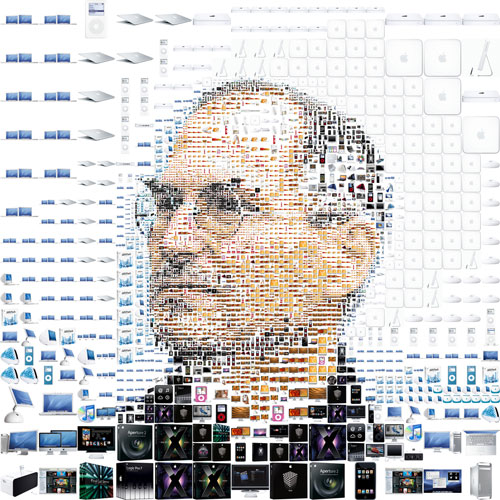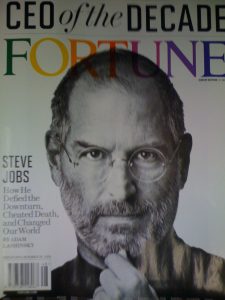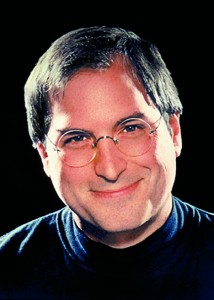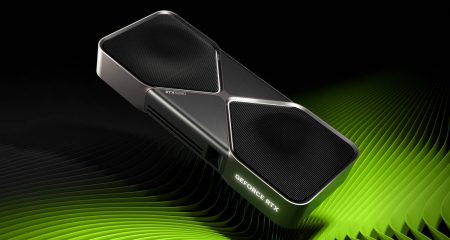
There are plenty of reasons why Steve Jobs is one of the most recognised personalities in business. But chief among them is the fact that he’s credited with having saved Apple and then turning it into the most valuable technology company in the world. The journey to the top hasn’t always been smooth, however.
Jobs dropped out of Portland’s Reed College before graduating, going on to found Apple with Steve Wozniak and the older Ronald Wayne in the late 1970s. The company’s first real success came with the Apple II series, the first mass-produced range of personal computers.
Many credit Jobs with pushing Apple to create a graphical user interface (GUI) — others say the company stole it from Xerox — and incorporating it in the Macintosh computer in 1984. The Mac made personal computing far more accessible to ordinary consumers — it was less threatening and so far more appealing.
A year later, Jobs lost a power struggle with CEO John Sculley — who he’d hired from Pepsi — and was fired (the official line was he resigned). It would prove to be the biggest mistake the company ever made.
Jobs moved on and started Next — later known as NeXT — that designed and manufactured computer systems for education and business applications, but became better known for its programming platform, OpenStep. The software, along with another of NeXT’s products, WebObjects, became so well known that Apple bought the company in December 1996 for US$429m plus equity.
OpenStep would go on to form the basis of Apple’s Mac OS X operating system, with Jobs returning first as temporary CEO, replacing Gil Amelio who had engineered the NeXt acquisition. In 1997, he returned to the company’s helm. At the time Apple was in desperate financial trouble. Its operating system was ageing and its computers weren’t keeping pace with the growing popularity of PCs running Microsoft Windows.
Then came the iMac, Jobs’s first attempt at reinvigorating the Mac and making it cool and desirable again among consumers. Its radical design — colourful, bubble-shaped machines — caught the world’s imagination. PCs were seen as grey and dull. The iMac changed the popular view that computers were boring and more than a little intimidating.
The iMac introduced the “i” in Apple product nomenclature. It was meant to refer to both “Internet” and “individual”, the latter eventually a target for ridicule from Apple detractors who often claimed that Apple’s design tends to be so minimalist you can’t tell its products apart.
Despite the good reception, the iMac remained a niche product, particularly because of the dominance of Microsoft in the 1990s in both the home and business markets.

It wasn’t until the iPod was introduced in 2001 that Apple’s fortunes really began to take off again. The portable music player would turn Apple into a consumer electronics giant and cement Jobs’ place in the annals of technology history. He’s known for his hyperbole, when he said shortly after the iPod’s launch that it would “go down in history as a turning point for the music industry” he wasn’t wrong. “This is landmark stuff. I can’t overestimate it,” he said at the time.
In the process, Apple took the portable music player market from Sony, which had dominated in an earlier era with the Walkman.
Since its launch, Apple has sold more than 200m iPods and the company has gone on to become the world’s biggest retailer of music through the iTunes store.
Jobs has been such a success not only because of the manner in which he has shifted Apple’s focus over the years, and his role in encouraging the company to move into consumer electronics and music distribution — and then into mobile devices and applications — but because he bridged the gap between engineers and developers on one hand, and marketers and designers on the other.
Earlier this week, news emerged that Korea’s Samsung Electronics, a fast-growing Apple rival, was disputing a patent infringement lawsuit against it on the grounds that the US company had stolen the idea for the iPad from imaginary devices featured in Stanley Kubrick’s 2001: A Space Odyssey.
Though it’s a bizarre argument, and one unlikely to succeed in court on account of the precedent it would set and the floodgates it would open, it underscores an important point: Apple’s industrial design is extraordinary. Or as some might argue, so good that it’s difficult to better.
Further support for this argument comes from the relative lack of product diversity in the Apple product line-up. On the back of just a few products — the iPhone, Mac computers, the iPad and the iPod — Apple has become the most valuable technology company in the world.
Just as Apple has its critics, so too does Jobs. The company’s opponents cite the company’s closed ecosystem, draconian control of content and applications in its online stores and insistence on proprietary connectors and accessories for the bulk of its products as reasons to loathe both the company and the man.

It may have detractors, but in purely financial terms it’s hard to fault the company. For the most part, consumers love its products and appreciate its online services.
From the iPod to the iPad 2, ease of use combined with clever industrial design has seen Apple products enjoying favour with people in an expandinge range of sectors and across the age groups. Its products are considered expensive, but then no one has yet said of a piece of Apple kit that it’s poorly made. Still, Apple is an aspirational brand but that is an important lesson the company has taught its competitors: if it’s great enough, people will pay. And they’ll do so in their millions.
Neither Jobs nor Apple are beyond reproach. The company has been accused of worker exploitation, taken to task for poor battery life and reliability in early generations of the iPod, chastised for its lack of willingness to license third parties to make accessories, criticised because of its lack of electronic waste management programmes and the high prices of its products.
Jobs, meanwhile has been accused of everything from being a megalomaniac and dictator to being a slave driver and a callous capitalist uninterested in corporate social responsibility, charity or philanthropy in general. Bloomberg also once reported he was dead when it accidentally ran a prepared obituary. He denied the allegation, which understandably settled the matter.
Despite the criticism, there’s no denying that he’s became a titan of the technology industry. More than that, he’s one of its few genuine rock star personalities in business and the catalyst for many students who choose to study computer science or business.
Like Microsoft co-founder Bill Gates and Facebook co-founder Mark Zuckerberg, Jobs has shown that those who want to change the world and make a fortune doing it should go into technology. He hasn’t just built an instantly recognisable brand, he’s built a business empire.
It’s an empire that’s going to have to work hard to maintain its current dominance and the announcement that Jobs will continue to chair Apple’s board of directors should help reassure investors that the changing of the guard — long-serving chief operating officer Tim Cook is taking over as CEO — doesn’t represent the peak of Apple’s fortunes. The company’s share price outperformed the general market the day after the news of Jobs’s resignation broke, suggesting investors are confident in Cook’s ability to continue the growth story.
Jobs is also a stark reminder of our own mortality. Despite calls to respect his privacy, his health has been a source of constant debate and speculation in recent years. It may finally have got the better of him. In stepping down, Jobs has displayed another attribute found in great leaders: they know when to call it a day.
Steve Jobs’ 2005 Stanford Commencement Address (via YouTube):
Jobs has been an uncompromising leader, a vocal advocate for matching form to function, a pioneer in the field of consumer electronics, an astute businessman, a trend predictor and at times the target of vitriol and derision.
Under his leadership, Apple has generated hundreds of billions of dollars in shareholder value in a cutthroat industry.
He once quipped he was the “iCEO”. It’s a fitting moniker for a man who has been responsible, however indirectly, for changing the face of the music industry, computers and the consumer electronics market. — Craig Wilson, TechCentral
- Top image mosaic: Tsevis (Creative Commons BY-NC-ND 2.0)
- Subscribe to our free daily newsletter
- Follow us on Twitter or on Facebook




